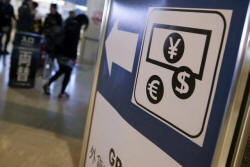|
 Don't
lie, don't cheat, don't start rumors, says new FX code Don't
lie, don't cheat, don't start rumors, says new FX code
 Send a link to a friend
Send a link to a friend
[May 26, 2016]
By Patrick Graham
LONDON (Reuters) - The first global code of
conduct for currency trading has banned dealers from lying and starting
false rumors as part of a raft of new guidelines aimed at rebuilding
trust in the world's biggest financial market.
|
|
The document, launched on Thursday after evolving from a handful of
regional codes used previously, focuses largely on the detail of how
banks deal with clients' orders and what market participants can and
cannot say to one another.
On those issues alone, it includes dozens of individual directives
organized under 11 broader "principles", as well as an extended
annex of specific examples of appropriate and inappropriate formulas
for discussing market moves.
But it leaves the big issue of governance, and how the code will be
policed, for further work over the next year. The issue of
high-speed electronic trading, which has changed the face of the
industry over the past decade, is also left for later.
The code is part of the industry's response to charges of market
manipulation and misuse of confidential customer order information
which saw seven of the world's top banks fined around $10 billion at
the end of a huge global inquiry last year.
"The foreign exchange industry has suffered from a lack of trust,"
Reserve Bank of Australia Assistant Governor Guy Debelle, who
chaired the panel of 21 central banks working on the document since
last July, told reporters on a conference call. "The market needs to
rebuild that trust."
Sharing of confidential client order information via FX traders'
electronic chatrooms with names such as "The Cartel" and "The
Bandits' Club", particularly around the benchmark currency rates
known as the 4 o'clock London fix, was central to the scandal.
On top of the bank fines, dozens of traders were fired and the
setting of daily market benchmarks was rethought.
But many traders say that the resulting fear of talking freely about
the market has increased the risk of trading and discouraged some of
the speculation which made the market able to swallow large orders
easily without volatile moves in prices.
The code specifies, for example, that information contained in
banks' research can only be shared after it is published, and client
order information can only be shared "sensitively" and if there is a
"valid reason" for doing so.
MARKET COLOR
Perhaps the most nebulous area of communication surrounds "market
color", which traders have said in the past led to banks and clients
revealing details of particular orders which were moving currencies
at a given time.
[to top of second column] |

Whether banks' senior management and even Bank of England officials condoned
this degree of information-sharing has been a grey area in the row over market
manipulation, and formed part of a number of traders' defense cases.
According to the Code, the seeking and sharing of market color is appropriate as
long as it is "properly aggregated or anonymized and restricted to seeking
information on market liquidity and sharing market views and opinions without
disclosing specific trading positions or intention to trade."
Discussion of broad types of clients is appropriate, but use of language that
would allow the listener to deduce the identity of the client concerned is not.
Among other things, participants are also expressly banned from lying to others
or starting rumors about reasons for market moves that they know to be untrue,
in aid of moving the broader market.
David Puth, head of global settlement bank CLS and chair of the panel of 35
banks and other participants who contributed to the work, told Reuters he hoped
the code would allow the $5 trillion a day market to grow again after a static
three years hampered by doubts over what is allowed and what isn't.
"I hope the work we have done will lead to an (overall) increase in volume. It
is certainly a goal and I do feel that the code will lead to a more
smooth-flowing market," he said.
(Additional reporting by Jamie McGeever; Editing by Mark Trevelyan)
[© 2016 Thomson Reuters. All rights
reserved.] Copyright 2016 Reuters. All rights reserved. This material may not be published,
broadcast, rewritten or redistributed. |